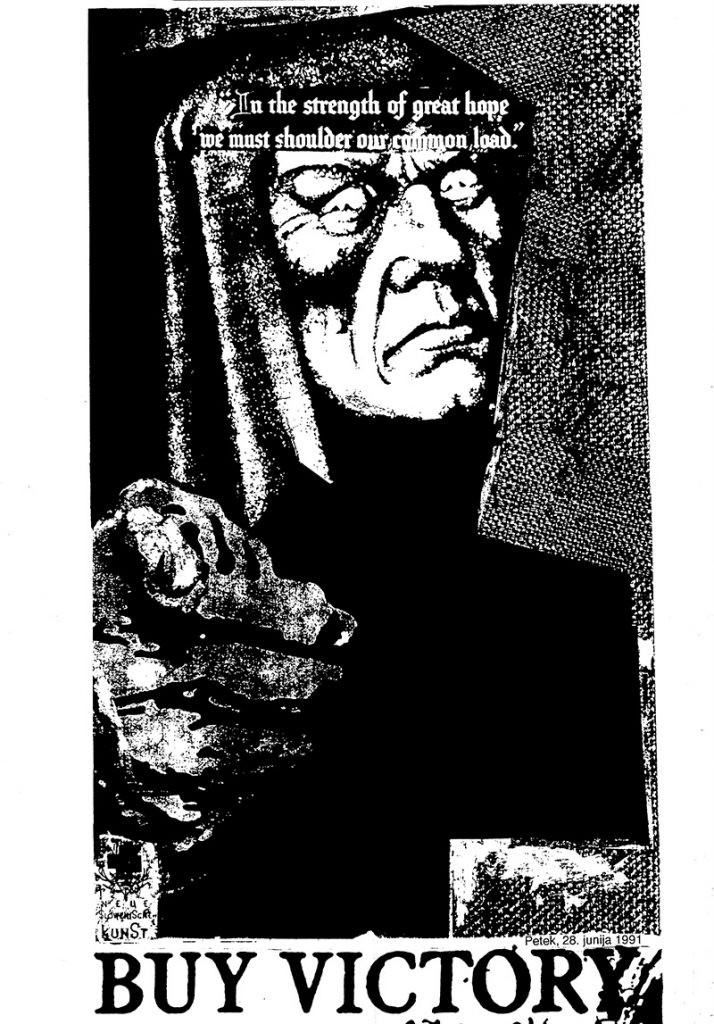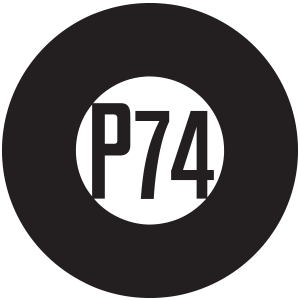
Novi kolektivizem, Buy Victory, silkscreen, 100 cm x 70 cm, 28 June 1991

Novi kolektivizem, Matjaž Hanžek, LSD I Enjoy, edition, 1968
9 – 26 April & 9 – 28 May 2024
KAPSULA
>exhibition view @KAPSULA
_____
Matjaž Hanžek, Laibach Kunst, Dalibor Martinis, Novi kolektivizem, Ivan Volarič Feo
_____
Propaganda refers to a planned public dissemination of various ideological views with the aim to influence public opinion in political, economic, psychological, and other aspects. As it is often equated with manipulation, propaganda can be thought of in a pejorative sense as falsification or deliberate concealment of facts. The term comes from the 1622 Congregation for the Evangelization of Peoples within the Roman Catholic Church, which in Latin was known as Sacra Congregatio de Propaganda Fide. The congregation’s primary purpose was to spread the Catholic faith in non-Catholic lands. After 1790, the term propaganda began to be used for persuasion in circles outside the church.
In the modern sense, the term became domesticated in the mid-19th century when propaganda as a means and method of communication and manipulation with the public began to be used for political purposes. Edward Bernays has a special place in this complex story. His mother, Anna, was Freud’s sister. Bernays is considered the father of PR strategies. Already during World War I, he helped Woodrow Wilson promote the idea of the United States as an exporter of democracy. Propaganda had a bad reputation, so Bernays promoted a new phrase: Public Relations. In his groundbreaking work Propaganda (1928), he called for a conscious and intelligent manipulation of the habits and opinions of the masses as a decisive element of a democratic society. Those who manipulate the invisible mechanisms of society create an invisible government that is the state’s real ruling power. Bernays soon realised that crowds can be controlled and manipulated. He developed an astonishing technique for changing public opinion and claimed that people do not buy because of their needs but because of their wants. He argued that democracy and capitalism are the same and that consumption fills the void. These statements were groundbreaking and fateful.
The 20th and 21st century artists have variously problematised topics such as the politicisation of art, artistic and political propaganda, truth, and manipulation. Marketing techniques have penetrated deeply into the methodology of political propaganda, which trades in political practices no differently than in merchandise. Nowadays, when lies and manipulations are becoming the dominant discourse of public speech and politics, one of art and culture’s critical tasks is exposing them.
The 1960s and 1970s countercultural art movements problematised consumerism, the ideology of power, and forms of hierarchical political operations. LSD I Enjoy, a 1967 piece by Matjaž Hanžek (1949, Slovenj Gradec), consists of six matchboxes. In this piece, termed as a pop item, a personal statement becomes public, the statement of the entire community. The ideology of enjoyment is closely related to consumption itself, and capitalism demands it.
The Laibach Group produced not only music but also visual works. These appeared in gallery spaces under the name Laibach Kunst and showcased posters, paintings, woodcuts, spatial installations, video works, and performances. In the early 1980s, the group founded and defined a retro-avant-garde movement. Their Monumental Regro-Avant-Garde exhibition (21 April 1983) featured a poster interpretation of Ivana Kobilca’s 1888 painting The Coffe Drinker in Xerox processing and assembly, representing their ready-made and cut-up methods.
The New Collectivism design studio was founded in 1984 by Dejan Knez, Miran Mohar, Darko Pokorn, and Roman Uranjek. In addition to creating their brand, they designed catalogues, posters, records, and promotional items. The political poster inhabited a unique space in their work. The most controversial was undoubtedly their poster for Youth Day 1987, which postmodernly collaged images of opposing ideological orientations. The Buy Victory and Bloody Ground, Fertile Soil posters were created between 27 June and 7 July 1991 as a political reaction to the ten-day war in Slovenia.
In his piece I Am Addressing You Man to Man, Dalibor Martinis (1947, Zagreb) tackles the issue of democratic society and protocols of truth. In 2003, he launched an intimate election campaign at bus stations in inland Istria. He put up posters displaying his portrait, added a bowl of candy, and the message I Am Addressing You Man to Man. Just like an artist’s portrait belonging to another time, bus stops likewise contribute to documenting the development of democracy. The photographic series I Am Addressing You Man to Man (2021) marks the last phase of this project.
Ivan Volarič Feo (4 September 1948, Sužid – 9 August 2010, Ljubljana), one of the central co-creators of the neo-avant-garde and counterculture in Slovenia, was a poet, visual artist, performer, and musician. In 1974, he published his poetry debut, Desperado Tonic Water, which became legendary. With an innovative use of language, play and humour, Ivan Volarič Feo introduced new content and subversively intervened in a conservative environment imbued with the values of the Catholic socialist tradition.
